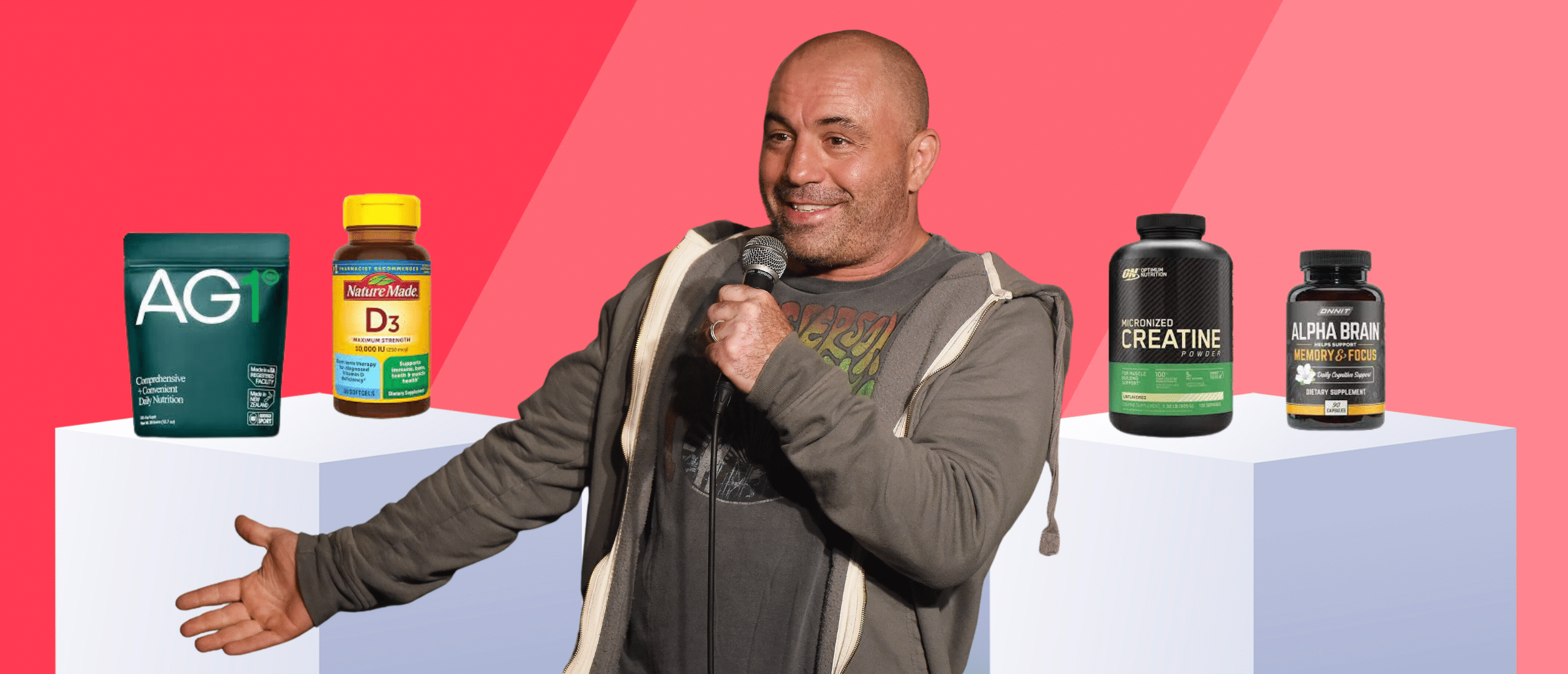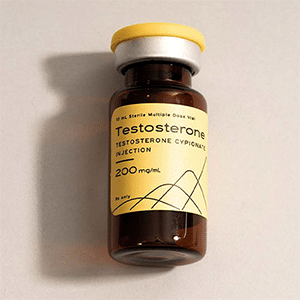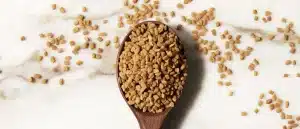Joe Rogan’s Supplement Stack Is as Controversial as His Opinions
- By Rebekah Harding
- Fact-checked by Joy Ferguson
- June 2, 2023
Every week on the Joe Rogan Experience podcast, its host and namesake seems to hype a new and controversial T boosting solution or buzzy workout supplement.
While Joe Rogan’s supplement stack boasts some research-backed additions like creatine and vitamin D, the Onnit co-founder also swears by a few that would probably have nutrition and fitness experts rolling their eyes. Here, we’ve compiled a full list of Rogan’s current, key supplements to let you know if they’re science-backed or side-eye worthy.
For Building Muscle
Judging by how ripped Rogan is at 55, you’d think he was a UFC fighter instead of an announcer. Here’s what he uses to boost his gains.
Creatine
Despite the “crazy (and debunked) rumor” Rogan helped spread that creatine can be commonly tainted with steroids (and weirdly, sometimes used to “cut cocaine”), Rogan swears by this supplement for its muscle-boosting abilities. Unsurprisingly, he uses Onnit’s Creatine Monohydrate—which we’d hope doesn’t come with bonus coke or ‘roids.
Creatine is one of the most widely studied supplements in the market right now. Research shows that it can indeed help build and maintain muscle, and may help increase lean body mass. (1, 2).
Your body naturally produces around one to two grams of creatine each day, but research has suggested that if you want to boost your muscle growth, taking an additional three to five grams of creatine supplements daily may bring results (3).

Protein Bites
While Rogan used to swear by Onnit’s now-discontinued hemp protein supplement, he’s switched over to the brand’s Protein Bites—which he calls “ridiculously addictive.”
One serving is packed with 7-9 grams of protein, depending on the flavor, so you’ll need to eat 3-4 to get as much protein as you would from one quality protein powder shake. Luckily, each box comes with 24 servings, so you’ll have enough to last a week.

For Gut Health
Rogan is known for talking shit—literally and figuratively. He’s a huge proponent of supporting gut health through supplements. A balanced gut can help keep things moving. It can also help prevent inflammation and a healthy gut may help prevent cancer (4).
Probiotics
Rogan’s diet is packed with probiotic rich foods like kimchi and kombucha. And he says that his routine often includes probiotic supplements.
Different probiotic strains have unique, potential gut-supporting benefit, so if you’re in the market for one, choose one based on your biggest GI issue:
- acidophilus DDS-1: Prone to bloating? This strain may help reduce abdominal pain and normalize stools (5)
- plantarum: Gassy? In one study, these bacteria were found to reduce gas and flatulence in people with IBS (6)
- rhamnosus: Some research suggests that this strain may help manage stress through your gut-brain connection by positively influencing GABA, a neurotransmitter (7).
- infantis: In some studies, these bacteria lowered inflammation in the intestines and improved symptoms of bowel disorders like IBS and ulcerative colitis (8, 9).
- lactis: If you experience frequent constipation, this one may be for you. Studies found that these bacteria promoted regular bowel movements (10).
To be fair to Rogan, Onnit’s Total Gut Health contains all 5 of the above strains, plus S. Boulardii, a gut-friendly, acid-resistant yeast that helps support the newly added microorganisms. TL;DR: it may make your trips to the bathroom more regular (11).
Taking a probiotic with at least 5 billion CFU is recommended. And certain probiotics may help improve your heart health by helping to reduce cholesterol levels or lower blood pressure, especially when these are elevated (12); and they may boost your gut health (13). And look for acid resistant strains to make sure they make it to your gut.

Greens
Rogan says he “takes a giant Athletic Greens every day.” AG1 (from his podcast sponsor Athletic Greens) is a gut-supporting blend containing over 75 vitamins, minerals, and whole vegetable sourced ingredients like spirulina, pineapple, and papaya. It can be mixed with water and drank easily on the go.
One study found that spirulina (blue-green algae) supports the growth of beneficial intestinal microbiota like Prevotella, Porphyromonadaceae, Barnesiella and Paraprevotella (14). These bacteria may help lower blood lipid levels, prevent liver disease, and support digestion.
AG1 also contains papain from papaya and bromelain from pineapple: digestion-boosting enzymes that help break down protein (15, 16).
And just one scoop of AG1 contains 7.2 billion CFU of Lactobacillus acidophilus and Bifidobacterium bifidum probiotics.

For Immunity
While Rogan had some iffy takes on COVID prevention and treatment, the pandemic jump- started his efforts to boost his immune health.
Vitamin D
Rogan says he takes around 5000IU of vitamin D daily. The CDC says vitamin D can improve your body’s ability to fight bacterial and viral infection. Bonus: Vitamin D may also help reduce inflammation, support brain function, and lower risk for some cancers according to Harvard University.
In an appearance on Rogan’s podcast, longevity expert Rhonda Patrick, Ph.D., recommends finding out your vitamin D baseline by getting a blood test before calculating how much you need to take daily. If your levels are low, talk to your healthcare provider about supplements.

IV Vitamin Drips
After partnering with Dave Chappelle for a comedy sketch, Rogan says he decided to steal one of the comedian’s immune health tricks: weekly intravenous vitamin drips. These drips contain zinc, vitamin c, and glutathione.
“If you don’t feel good, if you’re kind of dragging, an IV vitamin drip is fucking spectacular,” Rogan said. “You bounce back so well from a hangover.” Sure, if a $200+ price tag doesn’t give you a different type of morning-after regret.
Studies show that vitamins and minerals in Rogan’s intravenous cocktail can support your immune system (17). But Sam Torbati, M.D., the co-chair of Emergency Medicine at Cedars-Sinai Medical Center wrote in a blog that most of the feel-good benefits of an IV vitamin drip come from the boost in hydration, specifically water and salt, not the nutrients. “You could get [that] from a sports drink,” he wrote.
To save time and cash, opt for an oral zinc, vitamin C, or glutathione supplement.

For Cognition
You’d be hard pressed to find a guy more obsessed with the brain-boosting benefits of nootropics than Rogan. Nootropics, or “smart drugs,” are a group of supplements that claim to support memory, learning, and focus—kind of like a less intense version of the pill from the 2011 film Limitless.
But here’s the thing: While some dietary supplements billed as nootropics have some promising science behind individual ingredients, experts largely agree that the use of nootropics by healthy individuals to boost brain health is “concerning due to the lack of clinical evidence regarding their efficacy, safety, and social consequences, especially in long-term use” (18).
Rogan isn’t waiting for the science; he’s been taking nootropics since trying NFL linebacker Bill Romanowski’s Neuro 1 (which inspired him to develop his own nootropic formulas with Onnit).
That also means we’re giving all his nootropics a side-eye, at least until science catches up.
Neuro Gum
Rogan told Rhonda Patrick that he “fucking loves” chewing Neuro Gum (which, hey, look at that, is a podcast sponsor) before filming the podcast or doing kickboxing workouts. This nootropic gum contains caffeine, vitamins B6 and B12, and L-theanine, which he says works to boost his energy levels and focus.Patrick said she loves L-theanine for its “calming” effects. In one study, a combination of L-theanine, vitamins B6, B9, B12 and rhodiola, was beneficial for treating chronic stress in otherwise healthy subjects (19).

Alpha BRAIN
When Rogan was working with the Onnit team to develop this nootropic formula, he says he knew the name was an easy sell. Alpha BRAIN claims to support memory, mental speed, and focus.
He says he’s been taking Alpha BRAIN before stand-up performances and UFC announcing since 2010 to make it easier for him to remember his lines.
“What I noticed when I started taking it was that I had a better recall of words. That frustrating thing where you’re like, ‘What’s the word? What’s the word?’ it wasn’t happening as much,” he tells Onnit co-founder Aubrey Marcus in a Youtube video. “My ability to form sentences seemed smoother. It seemed like I had an extra gear, like I was one step ahead.”
Among Alpha BRAIN’s ingredients are huperzia serrata and bacopa, which studies suggest may inhibit the breakdown of acetylcholine, a neurotransmitter that supports nerves, muscle cells, and hormonal glands (20, 21).
Like its name, Alpha BRAIN also includes ingredients like L-theanine and phosphatidylserine. phosphatidylserine. One study found L-theanine increased alpha brain waves, which supports a wakeful, relaxed state; and the results of a study on phosphatidylserine suggested that it may support cognition (22, 23). Your brain is at its calmest when your alpha brain waves are firing at their peak, according to Jefferson Health (24).

Lion’s Mane
The evidence on this one is ehh. In one small study published in 2009, Lion’s Mane showed promise in improving brain function in participants with mild cognitive impairments but who were otherwise healthy. But that improvement stopped after they stopped taking it (25). Another more recent study, with participants that had normal cognitive function, noted improvement in only one of three cognitive tests after 12 weeks of taking Lion’s Mane (26). These suggest that taking this ‘shroom may not give you long term benefits, if any at all.
Nevertheless, Rogan is obsessed. He likes to swap his morning brew with podcast sponsor Four Sigmatic Mushroom Ground Coffee to get his daily (and arbitrary) dose of Lion’s Mane.
“Four Sigmatic has become a key part of my daily routine. I drink Four Sigmatic Lion’s Mane all the time… It actually tastes great, and it’s damn good for you… just a whole lot of power. Their company is fucking slick,” he said.

For Boosting Testosterone
Rogan has touted potentially T boosting supplements like tongkat ali and turkesterone through conversation with expert guest Huberman. But when it comes to boosting his own testosterone, he has opted for the medical, not supplement route.
TRT
Rogan is vocal about his experience using testosterone replacement therapy (TRT) to build muscle and maintain energy. Rogan started TRT in his 40s, starting with cream before switching to injections.
“It’s real simple. If you’re fine with not feeling good, good! If you’re not fine with it, hormone replacement therapy exists for a reason, and that reason is it makes you feel way better,” he said on his podcast.
Your testosterone levels start to decline around your thirties, which may give way to debilitating symptoms like fatigue, weight gain and even erectile dysfunction. When prescribed by a physician, TRT is a safe way to get your levels back up to an optimal range and help mitigate symptoms.
If you’re concerned about your T levels, getting tested can determine if your hormones are where they should be for your age.

Hone’s at-home testosterone assessment is the simplest way to uncover whether your levels are low. If you qualify for treatment, TRT can be sent right to your door.
References
-
Forbes, et al (2022). Effects of Creatine Supplementation on Brain Function and Health.
-
Dinan, et al (2022). Effects of creatine monohydrate timing on resistance training adaptations and body composition after 8 weeks in male and female collegiate athletes.
-
Neto, et al (2018). Effects of Low-Dose Creatine Monohydrate on Muscle Strength and Endurance.
-
Cheng, et al (2020). The role of gut microbiota in cancer treatment: friend or foe?
-
Martoni, et al (2020). Lactobacillus acidophilus DDS-1 and Bifidobacterium lactis UABla-12 Improve Abdominal Pain Severity and Symptomology in Irritable Bowel Syndrome: Randomized Controlled Trial.
-
Ducrotte, et al (2012). Clinical trial: Lactobacillus plantarum 299v (DSM 9843) improves symptoms of irritable bowel syndrome.
-
Kochalska, et al (2020). Dietary supplementation with Lactobacillus rhamnosus JB-1 restores brain neurochemical balance and mitigates the progression of mood disorder in a rat model of chronic unpredictable mild stress.
-
Clarke, et al (2012). Review article: probiotics for the treatment of irritable bowel syndrome – focus on lactic acid bacteria.
-
Groeger, et al (2013). Bifidobacterium infantis 35624 modulates host inflammatory processes beyond the gut.
-
Dalziel, et al (2017). Promotility Action of the Probiotic Bifidobacterium lactis HN019 Extract Compared with Prucalopride in Isolated Rat Large Intestine.
-
Pais, et al (2020). Saccharomyces boulardii: What Makes It Tick as Successful Probiotic?
-
Wang, et al (2018). The effects of probiotics on total cholesterol: A meta-analysis of randomized controlled trials.
-
Bloemendaal, et al (2021). Probiotics-induced changes in gut microbial composition and its effects on cognitive performance after stress: exploratory analyses.
-
DiNicolantonio, et al (2020). Effects of spirulina on weight loss and blood lipids: a review.
-
Annahazi, et al (2021). Region-specific effects of the cysteine protease papain on gastric motility.
-
Hikisz, et al (2021). Beneficial Properties of Bromelain.
-
Bauer, et al (2020). What is the role of supplementation with ascorbic acid, zinc, vitamin D, or N-acetylcysteine for prevention or treatment of COVID-19?
-
Malik, et al (2022). Nootropics as Cognitive Enhancers: Types, Dosage and Side Effects of Smart Drugs.
-
Noah, et al (2022). Effect of a Combination of Magnesium, B Vitamins, Rhodiola, and Green Tea (L-Theanine) on Chronically Stressed Healthy Individuals—A Randomized, Placebo-Controlled Study.
-
Callizot, et al (2021). Huperzia serrata Extract ‘NSP01’ With Neuroprotective Effects-Potential Synergies of Huperzine A and Polyphenols.
-
Brimson, et al (2021). The effectiveness of Bacopa monnieri (Linn.) Wettst. as a nootropic, neuroprotective, or antidepressant supplement: analysis of the available clinical data.
-
Srimaharaj, et al (2018). Classification of human brain attention focused on meditation, effected by L-theanine acid in Oolong tea.
-
Ma, et al (2022). Phosphatidylserine, inflammation, and central nervous system diseases.
-
Alexander, et al (2019). Double-blind, randomized pilot clinical trial targeting alpha oscillations with transcranial alternating current stimulation (tACS) for the treatment of major depressive disorder (MDD).
-
Mori, et al (2009). Improving effects of the mushroom Yamabushitake (Hericium erinaceus) on mild cognitive impairment: a double-blind placebo-controlled clinical trial.
-
Saitsu, et al (2019). Improvement of cognitive functions by oral intake of Hericium erinaceus.














